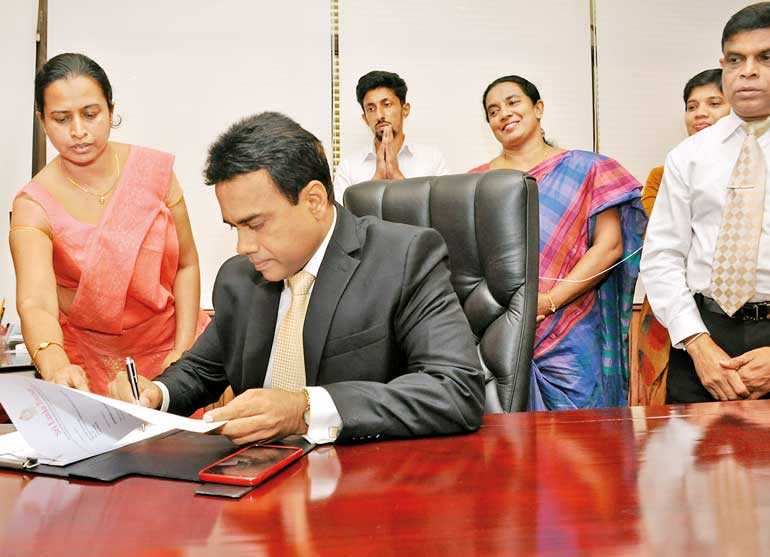Thursday Feb 19, 2026
Thursday Feb 19, 2026
Tuesday, 12 February 2019 00:19 - - {{hitsCtrl.values.hits}}

By Marianne David
Formulating an execution strategy to get Sri Lanka’s tourism marketing plan off the ground and aligning the tourism product with the expectations of stakeholders are immediate priorities, said top corporate personality Kishu Gomes, assuming duties as Chairman of two key tourism institutions last morning.
Gomes was appointed Chairman of the Sri Lanka Tourism Promotion Bureau (SLTPB) and the Sri Lanka Tourism Development Authority (SLTDA) by Prime Minister Ranil Wickremesinghe and his formal letter of appointment was presented by Tourism Minister John Amaratunga last week.
“My immediate priority is to come up with an execution strategy to get the marketing plan off the ground. That is number one in terms of the SLTPB. In terms of the SLTDA, it would be getting the product aligned with the expectations of the stakeholders,” asserted Gomes.
Assuming duties following religious observances, Gomes addressed the staff of the two institutions and called on them to work together and make his mission a success.
Outlining plans for SLTDA, Gomes told Daily FT the immediate plan would be to find new products to market in order to increase the numbers in every segment – ideally in the higher end to ensure more margins.
“What can we do to fill the 95,000 hotel rooms that we have in the country? It is said that by late 2020, there will be another 20,000 rooms getting added on. If you look at average occupancy, we all know it’s nowhere near 80-100%. There is so much we have to do in terms of promoting tourism to get the best returns on the investment the private sector has made. That’s why we need to think of new products and promote them,” asserted Gomes.
In his sights are adventure tourism, environment tourism, spiritual tourism, marine tourism and destination weddings.
“Adventure tourism is catching on everywhere in the world and across all segments of tourists there is a leaning towards environment-related tourism. See Ella today compared to 10 years ago – it has become a must-visit destination and there is so much happening in Ella. Spiritual tourism is another area that is catching on. In terms of wildlife, marine tourism will be high on the agenda. To be able to see whales and dolphins right through the year makes Sri Lanka a very attractive destination.
“There’s also the trend of destination weddings and Sri Lanka is a popular destination in that market. People who have destination weddings are super-rich and they have the wedding and related events over several days, while also spending extravagantly on dining and shopping.”
As for SLTPB and the marketing plan for tourism, Gomes said he was looking into the plan currently in place for the year and would retain anything that had resulted in good dividends.
“We will also look at the new things we can add. Based on our past experiences, we will remove what is not suitable – essentially it will be a refreshed plan that we will work on.”
In the backdrop of Sri Lanka’s limited carrying capacity, Gomes will prioritise high spenders but believes that in the short term the country needs the numbers as well.
“Given the exponential growth we have seen in tourism numbers, while we are not happy with the numbers achieved, in terms of growth rate it’s exponential. We need the numbers because we need scale. If we try to simply focus on high spenders only, it will not give us the value we want,” he explained.
Gomes said he would also keep the doors open for anyone who had an idea or needed to have a meaningful interaction with the two organisations.
“This way we will know where the trends are working, where we need improvement, and where we are doing well.”
Having worked at top Multi-National Corporations for some three decades and ending a 22-year stint at Chevron Lubricants Lanka PLC last year, Gomes brings with him key lessons from the private sector which he intends to put to good use at SLTPB and SLTDA.
Outlining the work ethic learnt from the private sector which he aims to propagate at SLTPB and SLTDA, he said: “Acute strategy formulation based on assessment of competition is key – What is the level of competition? What is the nature of competition? Do we have the strategies in place in order to take on those challenges? And of course, very effective, aggressive, and timely execution, bringing every single individual who has a role to play into the team with one common goal in mind, getting everyone’s buy-in for that strategy, and getting things done through motivation.”
His intention is to show the staff how his mission will help the poor people of the country and elevate the image of the two institutions, so that they can feel proud about their organisations and experience the positive impact on their lives as employees.
“I don’t consider this a job. This is my social obligation. If I wanted a job I could have found one that would give me a few millions on a monthly basis. This is all for the poor people of my country. Having worked for MNCs for three decades and having been the CEO of a top MNC for 18 years, the reason I got out was to better serve my country, to serve the poor. That’s my target and I will commit myself fully to deliver it,” he concluded.
